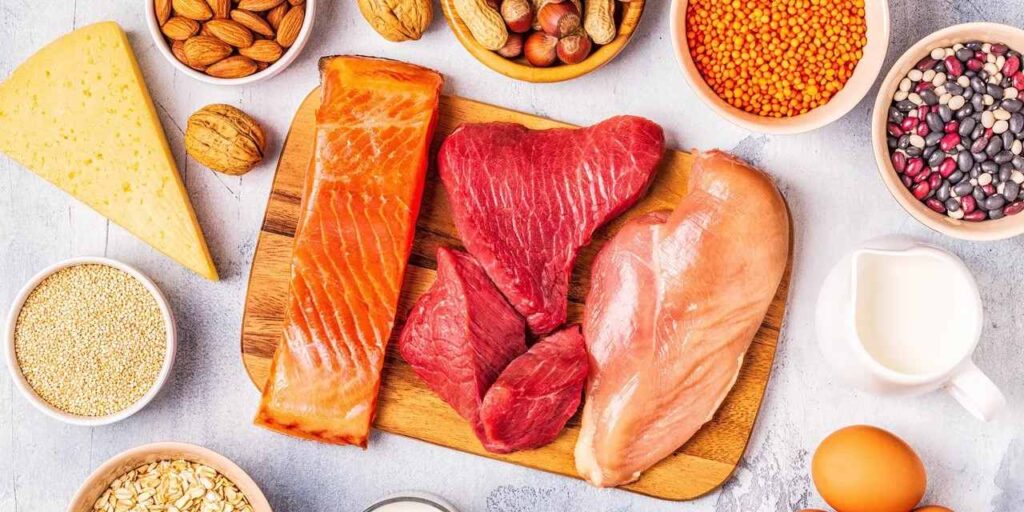Protein deficiency is a serious issue that’s often underappreciated, yet it affects so much of our well-being. Protein is the foundation for a healthy body and mind, supporting everything from strong muscles to balanced emotions. When we don’t get enough protein, it can quietly lead to a range of health challenges, impacting not only our physical strength but also our mental health, immune system, and overall vitality. Prioritizing proper nutrition can make a profound difference in living a healthier, more vibrant life.

Protein Deficiency Is More Dangerous
| Aspect | Details |
|---|---|
| Symptoms of Protein Deficiency | Fatigue, muscle weakness, hair loss, brittle nails, frequent infections, and mood changes. |
| Causes of Protein Deficiency | Inadequate intake, malabsorption, chronic illnesses, aging, or strict vegetarian/vegan diets. |
| Risks of Protein Deficiency | Muscle wasting, immune system failure, stunted growth in children, organ damage in severe cases. |
| Recommended Protein Intake | 0.8 grams per kilogram of body weight for adults, higher for athletes, elderly, or pregnant women. |
| Sources of Protein | Lean meats, fish, eggs, dairy, legumes, nuts, seeds, tofu, and quinoa. |
| Treatment | Increase protein intake, consult healthcare providers for underlying causes, and consider supplements. |
| Global Perspective | Protein deficiency is a global issue, especially in developing countries, leading to malnutrition and health issues. |
| Protein’s Role in Weight Loss | Protein helps control hunger, boosts metabolism, and helps preserve muscle mass during weight loss. |
Protein deficiency is a significant health concern that deserves our attention and care. It can affect so much, from weakened muscles to feelings of low mood, touching many aspects of our lives. Whether it’s due to limited protein in your diet, a medical condition affecting absorption, or uncertainty about how to improve, there’s hope—boosting your protein intake is a straightforward and powerful step forward. By making small changes to include more protein-rich foods in your daily meals, you can protect your health, prevent long-term issues, and nurture your overall well-being with compassion and confidence.

What Is Protein Deficiency and Why Should You Care?
The Vital Role of Protein
Protein is often called the “building block” of the body because it is involved in nearly every bodily function. It is essential for the repair and growth of tissues, the production of enzymes and hormones, and supporting a healthy immune system. Without enough protein, your body starts to suffer, leading to muscle weakness, fatigue, and poor recovery after exercise.
In essence, protein is a foundational nutrient for health. Without it, your body can’t function properly—and this is where protein deficiency becomes dangerous.
Signs and Symptoms of Protein Deficiency
1. Fatigue and Weakness
If you constantly feel tired, it may be more than just lack of sleep. Protein deficiency affects energy levels by hindering muscle repair and reducing stamina. Without sufficient protein, your muscles weaken, and your body has to work harder, which leads to fatigue.
2. Hair, Skin, and Nail Issues
Protein is essential for healthy hair growth and nail strength. A lack of protein can cause hair to thin or fall out and nails to become brittle. If your skin becomes dry and flaky, protein deficiency might be the cause. These external signs are some of the most noticeable and should prompt action.
3. Swelling and Fluid Retention
Protein helps regulate fluid levels in the body. When protein is low, you may experience swelling (edema) in your legs, feet, or hands due to fluid retention. This swelling is often a visible sign of protein deficiency.
4. Frequent Infections
Protein is integral to the immune system. Deficient protein levels can impair your body’s ability to fight off infections, making you more vulnerable to illness. People with low protein intake tend to catch colds and infections more frequently.
5. Mood Swings and Cognitive Impairment
Your brain needs protein to produce neurotransmitters that regulate mood and cognition. A lack of protein can lead to feelings of irritability, anxiety, or even depression. Cognitive abilities such as focus and concentration also decline when protein intake is insufficient.
The Importance of Protein at Different Stages of Life
For Children and Teenagers
Protein is critical during growth periods. Children and teenagers need protein to develop strong muscles, bones, and tissues. A lack of protein in growing children can lead to stunted growth, weak bones, and delayed development.
For Adults
Adults need protein to maintain muscle mass, regulate metabolism, and sustain energy. If protein intake is insufficient, muscle wasting and fatigue can occur. For adults, protein is also vital for immune function and maintaining healthy skin, hair, and nails.
For Older Adults
As we age, muscle mass naturally declines, and protein intake becomes even more critical. Older adults need more protein than younger adults to prevent muscle loss, preserve strength, and support metabolism. Protein helps reduce the risk of sarcopenia (age-related muscle wasting) and improves mobility and balance.
Causes of Protein Deficiency
1. Insufficient Dietary Intake
Many people fail to consume enough protein, either because they follow restricted diets or simply don’t include enough protein-rich foods in their meals. This is especially common among people who skip meals, follow vegan or vegetarian diets without proper supplementation, or don’t focus on protein-rich snacks.
2. Malabsorption and Digestive Issues
Certain digestive disorders, like Celiac disease, Crohn’s disease, or irritable bowel syndrome (IBS), can hinder the absorption of protein. In these cases, even if you’re eating protein-rich foods, your body may not be able to use them effectively.
3. Chronic Illness
Chronic diseases such as kidney disease, cancer, or heart disease can affect the body’s ability to retain or use protein. In some cases, these diseases can cause protein loss through increased metabolism or urinary protein leakage.
4. Aging and Protein Needs
As we age, the body’s efficiency in using protein declines. This means that older adults need higher protein intake to prevent muscle breakdown and maintain strength. It’s also common for older adults to eat less due to a reduced appetite, which can lead to insufficient protein consumption.
Related Links
Florida’s Junk Food Ban for SNAP Recipients — Here’s the Exact Date It Starts
Social Security Scraps Paper Checks — Here’s What Happens Next
SSI & Social Security Checks Incoming? See the Official August Payment Schedule
Protein Deficiency Is More Dangerous Prevent and Treat Protein Deficiency
1. Increase Protein-Rich Foods
Here’s the good news: you can easily boost your protein intake by eating a variety of protein-rich foods. Some options include:
- Animal-based proteins: Chicken, turkey, fish, lean meats, eggs, and dairy.
- Plant-based proteins: Lentils, beans, quinoa, tofu, edamame, and chia seeds.
For those following vegetarian or vegan diets, it’s especially important to consume a variety of plant-based protein sources to meet nutritional needs.
2. Consider Supplements
If you find it difficult to meet your daily protein needs, supplements such as protein powders (whey, soy, pea) or protein bars can help. Be sure to consult with a healthcare provider before starting any new supplements.
3. Protein Timing and Distribution
For optimal absorption, try to spread protein intake evenly throughout the day. Protein timing, especially around exercise, can help improve muscle recovery and growth. Try including a protein-rich meal or snack after your workout to aid in recovery.
4. Consult a Healthcare Professional
If you’re experiencing any signs of protein deficiency or suspect an underlying health condition, consult a healthcare professional. They can assess your diet, conduct tests, and recommend appropriate treatments or changes.
FAQs
Q: How much protein should I be eating daily?
A: The general recommendation is about 0.8 grams of protein per kilogram of body weight daily. However, if you’re pregnant, breastfeeding, or more physically active, your protein needs may be higher.
Q: What are the best plant-based sources of protein?
A: Great plant-based sources of protein include lentils, tofu, chickpeas, edamame, quinoa, and almonds.
Q: Can protein deficiency cause permanent damage?
A: If left untreated, severe protein deficiency can lead to muscle wasting, weakened immunity, and organ damage. However, most cases can be reversed with proper dietary changes and treatment.





